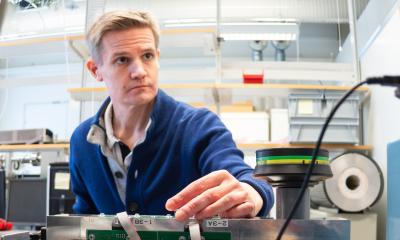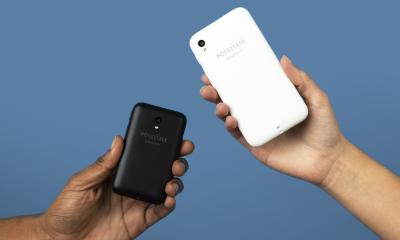Image source: Adobe Stock/oz
News • AI-powered app diagnoses glaucoma, diabetic retinopathy, cataracts
Take a selfie, early detect blindness-causing eye diseases
Two students on the Master's Degree in Bioinformatics and Biostatistics at the Universitat Oberta de Catalunya (UOC) have developed a mobile app capable of detecting in a matter of seconds whether someone is suffering from glaucoma, diabetic retinopathy or cataracts, three of the world's most common causes of vision loss and blindness.
Artificial intelligence analyses a selfie and issues a diagnosis that, if positive, directs its taker towards the most appropriate medical specialist.
The project, dubbed BegIA, is especially designed for use in parts of the world lacking easy access to healthcare, and has won the Ramón Molinas Foundation Prize for Social Impact at the 2023 SpinUOC, a UOC entrepreneurship and knowledge transfer programme organized by the Hubbik platform.
According to the World Health Organization (WHO), some 2.2 billion people around the world suffer from some kind of visual impairment or blindness. Half of these cases could have been prevented with early diagnosis. This is the reason behind the creation of the BegIA project (begia means 'eye' in Basque). "The idea for BegIA came from a personal experience. A relative suffering from type 2 diabetes began to lose a great deal of sight, to the point that they could no longer drive or read," explained Igor García Atutxa and Francisca Villanueva. "They developed diabetic retinopathy, an eye disease that causes vision loss and whose impact can be reduced with early diagnosis," they added.
The early diagnosis of eye disease requires an examination of the back of the eye, which itself calls for a specialist in ophthalmology with the required optical instruments. In developed countries and urban areas, access to such a service is no problem. However, those living in rural areas far from such specialists or in developing regions lack easy access to these tests. García Atutxa, a physicist specialising in data analysis, together with Francisca Villanueva-Flores, a biochemist specialising in degenerative diseases, have developed pioneering technology able to provide an ophthalmic pre-diagnosis that can distinguish between different diseases at once.
BegIA uses a neural network artificial intelligence algorithm able to leverage deep learning techniques to recognize, in a frontal image of the face taken by means of a mobile selfie, whether the subject has an eye disease.
They have already developed the algorithm, which they trained using images supplied by Mexico's Instituto Tecnológico y de Estudios Superiores de Monterrey, at which Villanueva-Flores is a researcher, and are now "in talks with hospitals and diabetes associations to secure images with greater variability, which will help us to train our algorithm better", indicated García Atutxa and Villanueva. The creators of the project, which follows the principles of WHO's VISION 2020 project for the prevention of blindness, estimate that it could be on the market within two years. The images they have used are of patients with retinopathy, glaucoma or cataracts. What the algorithm does is use calculations to fit the result to the image in question. "The more images we get, the more robust our algorithm becomes," noted García Atutxa and Villanueva.
In addition to the algorithm, the UOC master's degree students have also created an initial version of the mobile app for Android. "We entered SpinUOC because we wanted to develop a more sophisticated app that, in addition to detecting diseases, had more functions and could work on any mobile phone with limited computational capacity," explained the two students.
The BegIA mobile app is aimed at both the medical community and potential patients. In addition to early diagnosis of ophthalmological conditions, it will allow for remote medical monitoring. Once a doctor has made a diagnosis and set up a treatment plan for someone, they will be able to track its effectiveness and the evolution of the condition via images taken with the app, with no need for the patient to travel and invest large sums of money on ongoing medical care.
Source: Universitat Oberta de Catalunya
19.07.2023





